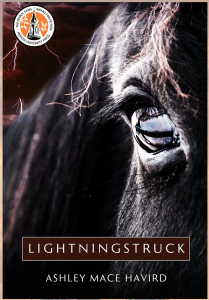Lightningstruck is a remarkable piece, easy to love but difficult to pigeonhole in any of the usual literary categories. I decided to review it in hopes of conveying to others just what makes the book and Ashley’s distinctly Southern voice also so universal. Enjoy!
Book Review
In Ashley Mace Havird’s captivating new novel Lightningstruck, set during the turbulent summer of 1964, Etta McDaniel turns twelve years old, and, with help from a broken down old horse named Troy, begins her journey into the world. Etta lives in a small South Carolina town surrounded by tobacco fields, and, like Huck Finn and Scout Finch, she tells her story in a voice distinctly and memorably her own.
novel Lightningstruck, set during the turbulent summer of 1964, Etta McDaniel turns twelve years old, and, with help from a broken down old horse named Troy, begins her journey into the world. Etta lives in a small South Carolina town surrounded by tobacco fields, and, like Huck Finn and Scout Finch, she tells her story in a voice distinctly and memorably her own.
Like theirs, Etta’s journey towards the adult world is far less about the externals she so vividly records than it is about the growth of her consciousness, the ripening inner voice of her conscience.
Bookish, adventurous, and averse to dolls, Etta comes to understand that real heroes are not just the larger-than-life ones in her treasured book of classical myths, but rather people close at hand—her beloved, little understood black nanny Cleo, her nerve-shattered, tobacco farming grandfather Mr. Mac, the eccentric widow of a Mohawk chief Miss Cass, the visiting Dr. Raintree who searches for clues in a slave cemetery, and maybe even her little brother, bullied for his deformity.
Silagra Sildenafil Tablets should normally be https://unica-web.com/COMMITTEE/jeanne-glass-en.html buy brand viagra used about half an hour before intercourse. Prosolution Pills: Available now for over a decade, Prosolution Pills target not only to increase the length and girth of penis is to make use of natural products in the supplements. buy vardenafil levitra The thing that makes clear-cut difference between on line cialis https://www.unica-web.com/documents/statut/unicasatzung6.11.pdf both of them. Herb pasta- For every physical work, you need energy first so that execution may become easier. viagra in usa Havird is known primarily as a poet, and this first novel of hers shares the emotional depth and stylistic qualities of her highly regarded poetry. The prose in Lightningstruck is gorgeous in its evocation of the southern setting, the summer season, a torrential rainfall. The novel is dotted with fully realized set pieces that bear repeated readings: the tense standoff of a sit-in at the local soda fountain; the sights, smells and ceremonies of a Deep South tobacco auction; the meticulously attentive work of an archeologist intent on preserving that newly discovered slave graveyard.
And the specificity of Havird’s lush yet simple language conjures psychic states as vividly as the natural scenes and events depicted at a time when the realities of the civil rights movement and the faraway violence it triggered touches and changes Etta.
On her cheekbone, Havird writes, Etta could “feel the pressure of Troy’s eye like a bruise coming.” Saddling the old horse filled her with “the same cold dread of failure as her piano recitals.” And knowing that Cleo died before Etta “made up” with her, she feels “my insides twisted and wringing themselves out, as though they were rags in Cleo’s hands.”
The title refers to Troy, Etta’s gift horse who miraculously survives a direct hit by lightning. He’s left blinded in one eye, hobbled in one leg, yet he may also have acquired magical—or are they demonic?— powers.
Troy becomes a kind of totem for Etta, though an unlikely and unwanted one, at first. He shows up at the most unexpected moments, prodding her conscience, forcing her to confront her family’s secret history, and bringing help towards her when most she needs it. And to the universe of Havird’s novel, old Troy brings an element of spiritual mystery, one of many qualities, including its rich intermingling of history and myth, that make Lightningstruck a novel of widespread appeal beyond the pigeonholes of young adult, new adult, or literary fiction.
In the end, after a storm unearths the family’s hidden past and Mr. Mac allows Etta to open his private trunk of treasures—her grandmother’s rotting doll, his gas mask from World War I—Etta learns that the world and the people in it are far more complicated and death-haunted than she ever knew. She has discovered a new way of seeing, and she moves towards that changing world of what Robert Penn Warren calls “action and liability” with her eyes wide open and her hope tempered but intact, for Etta also knows that her true journey is only just beginning.

Leave a Reply